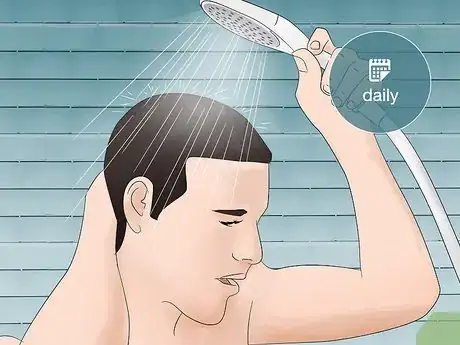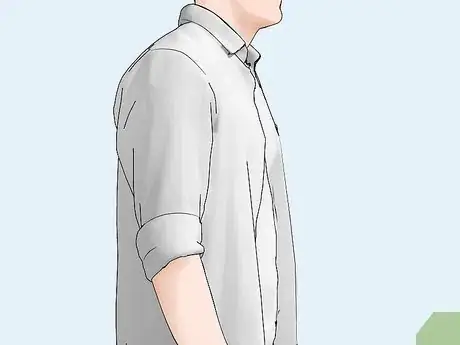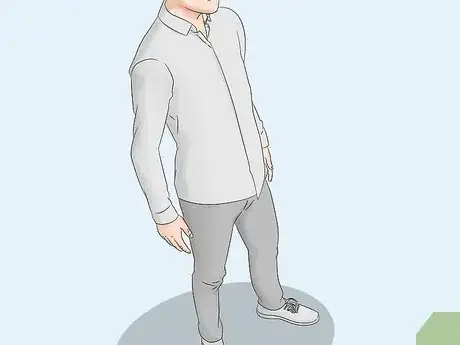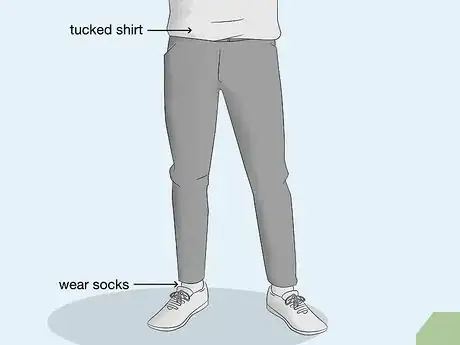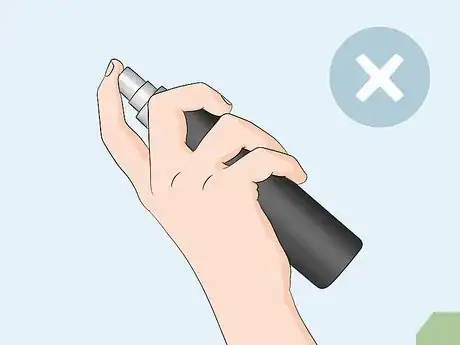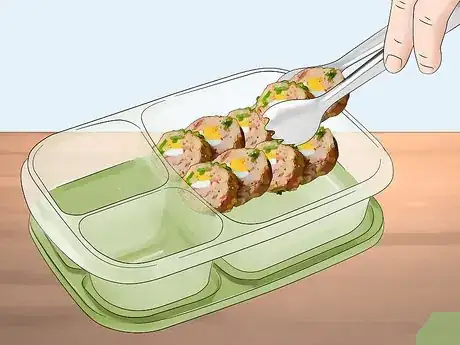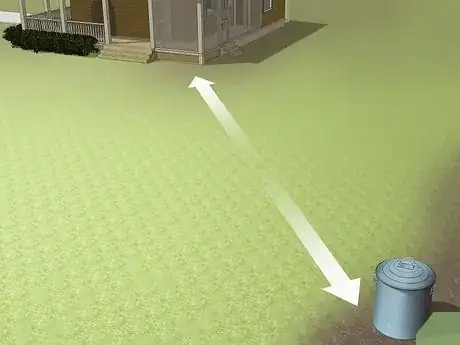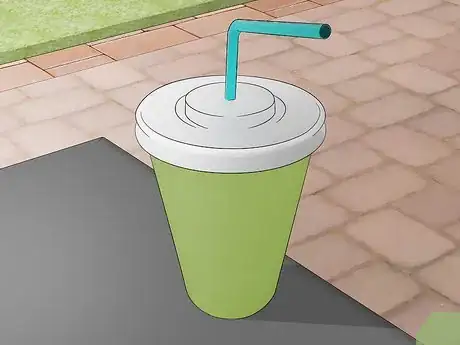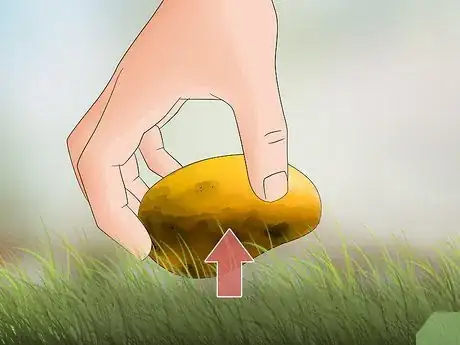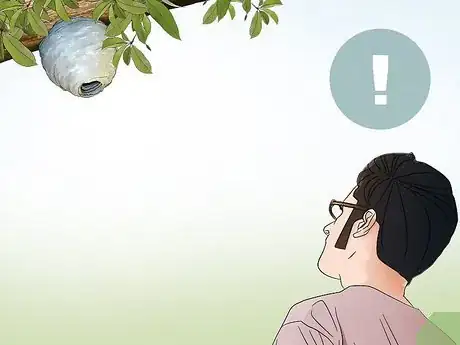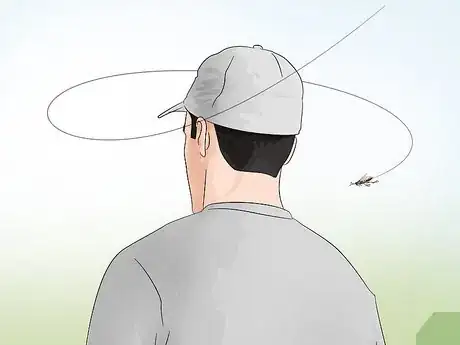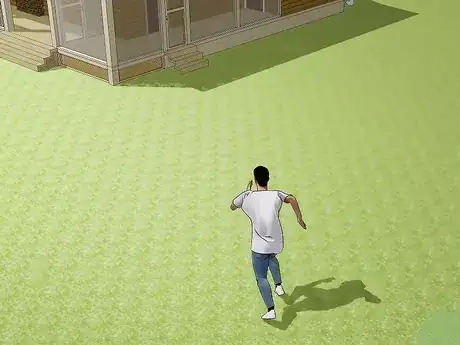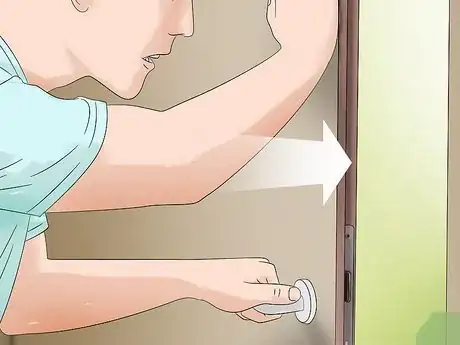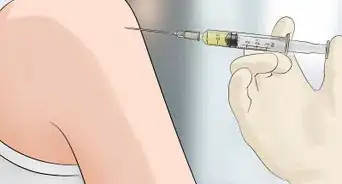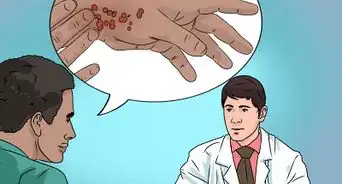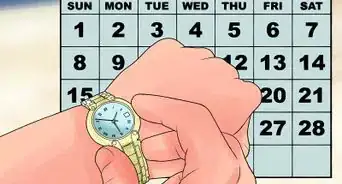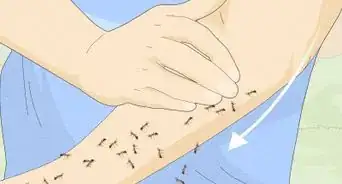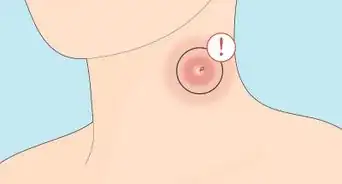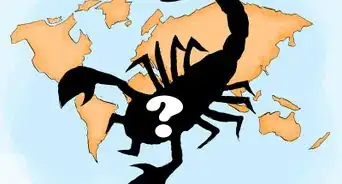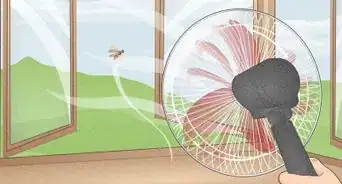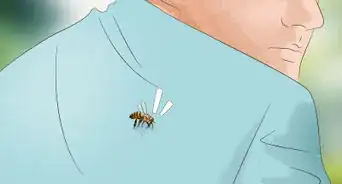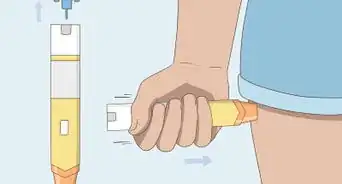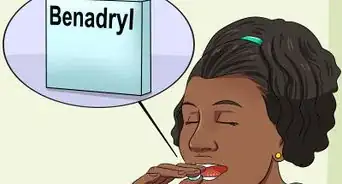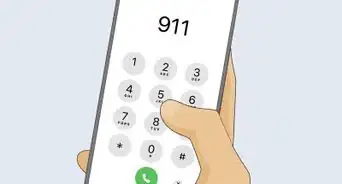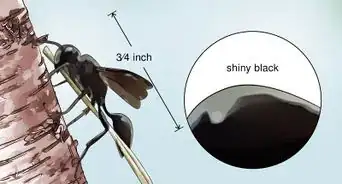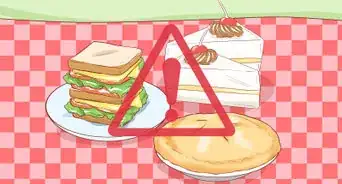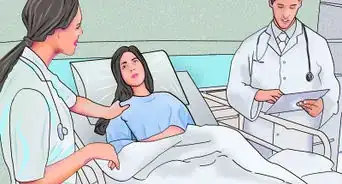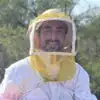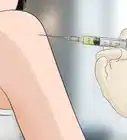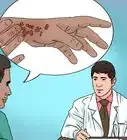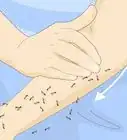This article was co-authored by Steve Downs and by wikiHow staff writer, Hannah Madden. Steve Downs is a Live Honey Bee Removal Specialist, Honey bee Preservationist, and the Owner of Beecasso Live Bee Removal Inc, a licensed bee removal and relocation business based in the Los Angeles, California metro area. Steve has over 20 years of humane bee capturing and bee removal experience for both commercial and residential locations. Working with beekeepers, agriculturalists, and bee hobbyists, Steve sets up bee hives throughout the Los Angeles area and promotes the survival of bees. He has a passion for honeybee preservation and has created his own Beecasso sanctuary where rescued bee hives are relocated and preserved.
wikiHow marks an article as reader-approved once it receives enough positive feedback. This article received 11 testimonials and 92% of readers who voted found it helpful, earning it our reader-approved status.
This article has been viewed 183,884 times.
Bees and wasps are important pollinators, but they do have sharp stingers that can cause a lot of discomfort. If you will be spending a lot of time outside this summer, you may be worried about coming into contact with stinging insects. Although avoiding bee and wasp stings can seem like a lot of work, you can take simple steps to stay away from these insects and make sure that they leave you alone.
Steps
Wearing the Right Clothing and Scents
-
1Bathe every day and wear clean clothes. The smell of sweat can throw bees and wasps into a frenzy. Make sure you start out your day with clean clothes and a fresh shower to avoid angering these insects. Keep a bandana with you to wipe the sweat off of your face throughout the day.[1]
- Sweating throughout the day can’t really be avoided, especially if you are working outside. However, starting the day with clean clothes and skin will help you attract less bees and wasps.
-
2Wear light-colored clothing. Bees and wasps instinctively perceive dark colors as a threat. Wear white, tan, cream, or gray clothing as much as possible and avoid black, brown, or red clothes.[2]
- Bees and wasps see the color red as black, so they perceive it as a threat.
Advertisement -
3Put on clothes that cover as much of your body as possible. Wear long sleeves, pants, a hat, and covered shoes when you go outside to give bees and wasps less areas to sting. If it’s hot out, wear breathable fabrics like cotton to avoid overheating.[3]
- Make sure you hydrate well when you wear long sleeves and pants so that you don’t overheat.
-
4Wear tight clothes that cling to your body. Flowing pants or tops create the perfect environment for bees or wasps to crawl inside toward your skin. Make sure your clothing fits you well and avoid boot cut or flare pants. Try to tuck your shirt into your pants and wear socks with your shoes.[4]
- If you have long hair, tie it back to avoid trapping bees or wasps.
Tip: Tuck your pants into your socks if you are worried that they are too flared at the bottom.
-
5Avoid wearing scented perfume or deodorant. Bees and wasps are attracted to the smell of flowers. If your perfume, cologne, or deodorant smells sweet, these insects could be attracted to your smell and be more likely to fly near you. Use deodorant or perfume that does not smell sweet or like flowers.[5]
- Bees and wasps are particularly attracted to the sweet scent of bananas.
Keeping Your Area Clean
-
1Dispose of food in airtight containers. Bees and wasps are attracted to the scent of rotting food. If you do need to get rid of food scraps, put them into an airtight container with the lid closed so that the smell won’t attract stinging insects.[6]
- Bees and wasps are especially attracted to banana peels, so make sure you close these up right away.
-
2Keep your garbage cans away from people. If you notice bees or wasps swarming over your trash cans, try placing them far away from your home and where people gather. Insects love to eat rotting food, so they will follow the trash can wherever you place it.[7]
Tip: Empty your trash cans regularly to get rid of bees and wasps swarming them.
-
3Put sweet drinks in containers with a lid. Bees and wasps are attracted to sugar, especially in drinks like iced tea and soda. If you are drinking a sugary drink, make sure you cover it with a lid when you set it down and check it for insects next time you pick it up.[8]
- Bees and wasps may crawl down your straw to get to your drink. Double check the inside of your straw before you drink out of it.
-
4Clean up any fallen fruit on the ground. In the summer, fruit trees may drop their fruit on the ground and attract insects. If you notice rotting fruit on the ground, pick it up and dispose of it quickly before any insects notice it.[9]
- Make sure you put the rotting fruit into a sealed trash can that is emptied out regularly.
Staying Away from Nests and Swarms
-
1Leave the area if you see a nest or an insect. You may accidentally sneak up on a nest without the bees or wasps noticing. If the insects aren’t swarming, you still have time to get away quickly without being stung.[10]
- Many bees create ground nests that can be hard to spot. If you see 2 or more bees crawling underground, they are most likely headed to a nest.
-
2Stand still if you notice a bee or wasp flying around you. Your instinct may be to yell or run, but this could make the insect more angry. Swatting or hitting at a bee or wasp will also make them more likely to sting you. Try to ignore your impulses and stand still.[11]
Tip: If there is a bee or wasp flying around you or near your face, it is probably trying to frighten you away from a nearby nest. Leave the area as fast as you can.
-
3Run away quickly if you accidentally disturb a nest. Cover your face with whatever you have handy and don’t stop running until you can’t hear the buzzing of the insects anymore. You may have to run as far as 1/4 of a mile before the insects get tired and stop chasing you.[12]
-
4Find an enclosed shelter to get away from the insects. A car or a home are ideal spots to run to, since they can be made airtight by shutting any doors or windows. Make sure the insects don’t follow you into your shelter when you open the door so that they can’t sting you.[13]
- Never head to a body of water to get away from bees or wasps. They will probably wait above the surface of the water for you to come up and then sting your head and face.
Expert Q&A
Did you know you can get premium answers for this article?
Unlock premium answers by supporting wikiHow
-
QuestionDo bees sting you for no reason?
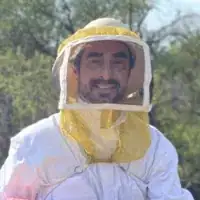 Steve DownsSteve Downs is a Live Honey Bee Removal Specialist, Honey bee Preservationist, and the Owner of Beecasso Live Bee Removal Inc, a licensed bee removal and relocation business based in the Los Angeles, California metro area. Steve has over 20 years of humane bee capturing and bee removal experience for both commercial and residential locations. Working with beekeepers, agriculturalists, and bee hobbyists, Steve sets up bee hives throughout the Los Angeles area and promotes the survival of bees. He has a passion for honeybee preservation and has created his own Beecasso sanctuary where rescued bee hives are relocated and preserved.
Steve DownsSteve Downs is a Live Honey Bee Removal Specialist, Honey bee Preservationist, and the Owner of Beecasso Live Bee Removal Inc, a licensed bee removal and relocation business based in the Los Angeles, California metro area. Steve has over 20 years of humane bee capturing and bee removal experience for both commercial and residential locations. Working with beekeepers, agriculturalists, and bee hobbyists, Steve sets up bee hives throughout the Los Angeles area and promotes the survival of bees. He has a passion for honeybee preservation and has created his own Beecasso sanctuary where rescued bee hives are relocated and preserved.
Live Bee Removal Specialist
Warnings
- Always carry a cell phone with you in the wilderness in case you need to call for help.⧼thumbs_response⧽
- If you or someone you are with has trouble breathing or loses consciousness after being stung, call for medical help right away.[16]⧼thumbs_response⧽
- If you know you are allergic to bee or wasp stings, talk to your doctor about being prescribed an Epipen.[17]⧼thumbs_response⧽
References
- ↑ https://www.cdc.gov/niosh/topics/insects/beeswasphornets.html
- ↑ https://www.scientificamerican.com/article/summer-safety-how-to-avoid-bee-swarm-attacks/
- ↑ https://www.cdc.gov/niosh/topics/insects/beeswasphornets.html
- ↑ https://www.ccohs.ca/oshanswers/biol_hazards/bees_wasps.html
- ↑ https://www.cdc.gov/niosh/topics/insects/beeswasphornets.html
- ↑ https://www.ccohs.ca/oshanswers/biol_hazards/bees_wasps.html
- ↑ https://www.ccohs.ca/oshanswers/biol_hazards/bees_wasps.html
- ↑ https://www.cdc.gov/niosh/topics/insects/beeswasphornets.html
- ↑ https://www.cdc.gov/niosh/topics/insects/beeswasphornets.html
- ↑ https://www.scientificamerican.com/article/summer-safety-how-to-avoid-bee-swarm-attacks/
- ↑ https://www.scientificamerican.com/article/summer-safety-how-to-avoid-bee-swarm-attacks/
- ↑ https://www.cdc.gov/niosh/topics/insects/beeswasphornets.html
- ↑ https://www.ccohs.ca/oshanswers/biol_hazards/bees_wasps.html
- ↑ https://www.cdc.gov/niosh/topics/insects/beeswasphornets.html
- ↑ https://www.mayoclinic.org/diseases-conditions/bee-stings/symptoms-causes/syc-20353869
- ↑ https://www.mayoclinic.org/diseases-conditions/bee-stings/symptoms-causes/syc-20353869
- ↑ https://www.mayoclinic.org/diseases-conditions/bee-stings/symptoms-causes/syc-20353869
About This Article
To avoid bee or wasp stings, try wearing red if you're going to be outside, since bees and wasps can’t see the color red. Avoid wearing white, yellow, or floral colors when you're going to be spending a lot of time outdoors since those colors attract bees and wasps. You should also avoid perfumed soap and shampoo that would make you smell more attractive to bugs. If bees or wasps are close by, don’t swing or swat at them, which can cause them to sting. Instead, stay calm and move away slowly. You’ll also want to avoid burning incense or scented candles outside since the smells will attract bees and wasps. To learn what time of day bees and wasps are most likely to sting, keep reading!
